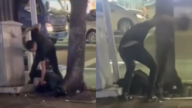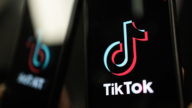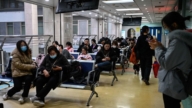【新唐人2013年01月09日讯】《南方周末》抗议阉割新年献词的事件,从编辑部员工扩展到全中国社会,从网络呼吁延烧到街头抗议。周一到周二,成百上千的市民聚集到报社外面,呼唤言论自由和新闻自由,形成自1989年以来,第一次以“民主政治”为诉求的集会。
周一开始,广州市民自发来到《南方周末》报社外面,声援《南周》编辑部员工反对新闻审查的行动。他们手持黄菊花或小纸牌,发表演讲,最多时人数达到上千人。广州自由作家野渡参加了集会,他说,昨天的现场气氛相当的热烈。
广州自由作家野渡:“因为你知道在中国八九年以后,民众的激烈抗议基本上都是跟私人利益有关,像征地,拆迁,环保等,但像这样的政治议题,这样的词汇,是八九年后第一次,而且在场人反应那么热烈,真的是看到人心思变。”
而在《南周》内部,编辑团队和管理高层之间正在进行激烈博弈。 1月6号晚间,《南方周末》官方微博发布声明,指说引发“南周事件”的新年特刊封面导言,是由报社负责人草拟,不是早前媒体人传出的是广东省委宣传部部长庹震操刀。而新年献词是报社编辑配合专题撰写,网上有关传言不实。
这项声明发布后,网络一片哗然,“南方周末新闻职业伦理委员会”1月7号凌晨两点半发表声明说,管理高层发布的声明极度扭曲事实,有理由怀疑这是省宣传部相关人士内外配合布局,企图扰乱舆论的行径。
一位匿名的前南方报业集团编辑表示,采编团队正在跟高层对话。
前南方报业编辑:“据说南方报昨天有人谈判了,南方周末采编这一批人和南方日报和南方周末高层有一个对话。具体结果怎么样,我也不知道。”
自十八大中共最高领导人换届后,人们对中国的宪政改革与新闻自由言论等怀抱希望。但是这次中宣部对《南周》的强硬态度,似乎与“宪政梦”相背离。
原中青报资深编辑李大同:“因为主管意识形态,管宣传的这个人没有换,这个人当了一辈子新闻自由的刽子手,现在还是他(刘云山),而新闻媒体管理议事日程现在还没有开始,习、李那里还没有开始,现在一切都是按照传统的惯性在走。什么敌对势力啊,这个那个的,可笑之至。”
李大同也表示,习近平还没有对新闻自由作出表态,他对新闻的态度现在还是一个谜。
“英国广播公司(BBC)”报导说,中国的宪政改革自1989年“六四民运”后停顿,渴望改革的中国知识份子在被压抑了二十多年之后,每次新领导人上台,只要有一点点放松和暗示的口径,许多媒体和知识份子就会发出要求宪政改革和新闻自由的呼声。
但是《南华早报》北京分社社长黄忠清向BBC表示,对中共新领导人抱有这些期望很幼稚,因为任何改革都会触及中国共产党作为一个整体的利益。而中共是保守的、不愿改革的,所以即使习近平愿意改革,也会面对非常强大的阻力。
黄忠清指出,中国的社会现实已经不允许政治改革无限期的延滞,不改已经无路可走,老百姓和习近平、李克强都意识到了这一点。但是宪政改革需要付出代价,尤其是新闻言论的自由,因为即使最开放的领导人,为了自己阶层的利益,也会尽力压制可能损害他们利益的新闻自由。
报导说,《炎黄春秋》与《南方周末》事件暴露了习、李政权并不会像公众此前预期的那样推动政治改革和民主进程。但黄忠清认为,目前还不能判断这是广东或北京政府,或是地方宣传部门的个别行为,还是,中共当局对新闻舆论加强的新一轮整体控制。他说,如果各地持续出现类似事件,才能显示这一届政府的改革诚意,也只停留在口号上。
采访编辑/秦雪 后制/君卓
Anti-censorship Leads to Democracy Rally on Streets
The Southern Weekly’s New Year edition message that was
tampered with leads to the whole Chinese society to protest on streets.
On Monday and Tuesday, hundreds of people gathered outside
to the newspaper agency, including the editorial staff and the network.
Calling for freedom of speech and of the press, the assembly was
the first since 1989, demanding a “democratic system”.
On Monday, people from Guangzhou City spontaneously came
to the Southern Weekly agency to support the “South Weekly”
editorial staff’s action against censorship. They were armed with
yellow chrysanthemum or small placards. They made speeches.
The maximum number of people reached a thousand at times.
Guangzhou freelance writer Ye Du took part in the rally.
He said the atmosphere was quite heart-warming.
[Ye Du, Guangzhou freelance writer]: “Since 1989,
fierce protests of this scale are associated with people’s private interests.
Such as land acquisition, demolition of homes,
and environmental protection etc.
This is the first time to see this kind of political issues and
hear words like these.
People responded so warmly, so you know they are changing."
There has been an ongoing intense struggle between the
Southern Weekly editorial team and senior management.
On Jan. 6th the Southern Weekly official microblog
issued a statement saying that
its New Year special edition cover was drafted by the agency,
but not Tuo Zhen, the Propaganda Minister.
The New Year Message was written by the newspaper editor.
After this announcement, there was an uproar on the network.
The Southern Weekly News Professional Ethics Committee
issued a statement at 2:30am on January 7.
This said the statement released by the senior management
had extremely distorted the facts.
There is a reason to suspect that someone within the agency
cooperated with the Provincial Propaganda Department.
This was an attempt to disrupt public opinion.
An anonymous former Southern Newspaper Group Editor said
the editorial team is engaging in a dialogue with higher levels.
He said: ”It is said that people from the Southern Weekly
had a dialogue with higher levels yesterday.
However, I do not know the results of that.”
Since the 18th Congress, Chinese people cherished a hope for
both constitutional reform and freedom of speech.
But the hard-liner attitude of the Central Propaganda Department
towards the Southern Weekly seems to run opposite to that hope.”
Original Zhong Qing Bao senior editor Li Datong: “Because
this person in charge of ideology and propaganda has not been
replaced, he has been an executioner of freedom of the press.
He walks the same path until new procedures are implemented.
It is pretty ridiculous mentioning of hostile forces etc.”
Xi Jinping has not made a stand for freedom of the press,
and his attitude towards the media is still a mystery.”
The BBC reported that the constitutional reform in China
has been a standstill since 1989.
Intellectuals in the Mainland will speak loudly
after 20 years of suppression.
When any new leader takes office,
he just shows a little relaxation or hints.
Many media people would call for constitutional reform
and freedom of the press.
However, the Bureau Chief of Beijing South China Morning
Post, Huang Zhongqing told the BBC,
that it is rather naïve to cherish any expectation of
the Party’s new leaders.
Any reform will eventually touch the Party’s interests.
The Chinese Communist Party (CCP) is conservative and unwilling to change.
Even if Xi Jinping wants to bring reform,
he will face very strong resistance.
Huang Zhongqing pointed out that the social reality in China
has not allowed the indefinite delay of political reform.
Without reform, the Party is approaching a dead end.
The public, Xi and Li all recognize that.
Constitutional reform comes at a price,
especially the freedom of speech and freedom of the press.
Even the most open of the leaders will try to suppress
freedom of the press, which might harm their interests.
The report says that the “Yan Huang Spring Autumn “and
Southern Weekly incidents exposed Xi- Li regime.
It does not want to promote political reform as the public
had expected them to.
But Huang Zhongqing cannot be sure whether the propaganda
department of Guangdong or Beijing was behind this incident.
If the CCP wants to strengthen the overall control of the news































